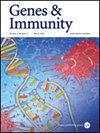Roles of TULA-family proteins in T cells and autoimmune diseases
IF 4.5
3区 医学
Q1 GENETICS & HEREDITY
引用次数: 0
Abstract
The T cell Ubiquitin Ligand (TULA) protein family contains two members, UBASH3A and UBASH3B, that display similarities in protein sequence and domain structure. Both TULA proteins act to repress T cell activation via a combination of overlapping and nonredundant functions. UBASH3B acts mainly as a phosphatase that suppresses proximal T cell receptor (TCR) signaling. In contrast, UBASH3A acts primarily as an adaptor protein, interacting with other proteins (including UBASH3B) in T cells upon TCR stimulation and resulting in downregulation of TCR signaling and NF-κB signaling. Human genetic and functional studies have revealed another notable distinction between UBASH3A and UBASH3B: numerous genome-wide association studies have identified statistically significant associations between genetic variants in and around the UBASH3A gene and at least seven different autoimmune diseases, suggesting a key role of UBASH3A in autoimmunity. However, the evidence for an independent role of UBASH3B in autoimmune disease is limited. This review summarizes key findings regarding the roles of TULA proteins in T cell biology and autoimmunity, highlights the commonalities and differences between UBASH3A and UBASH3B, and speculates on the individual and joint effects of TULA proteins on T cell signaling.

TULA 家族蛋白在 T 细胞和自身免疫性疾病中的作用。
T 细胞泛素配体(TULA)蛋白家族包含两个成员,即 UBASH3A 和 UBASH3B,它们在蛋白序列和结构域结构上具有相似性。这两种 TULA 蛋白都通过重叠和非冗余的功能抑制 T 细胞的活化。UBASH3B 主要作为磷酸酶抑制近端 T 细胞受体(TCR)信号传导。相反,UBASH3A 主要作为一种适配蛋白,在 TCR 刺激下与 T 细胞中的其他蛋白(包括 UBASH3B)相互作用,导致 TCR 信号和 NF-κB 信号下调。人类基因和功能研究揭示了 UBASH3A 和 UBASH3B 之间的另一个显著区别:大量全基因组关联研究发现,UBASH3A 基因及其周围的基因变异与至少七种不同的自身免疫疾病之间存在统计学意义上的显著关联,这表明 UBASH3A 在自身免疫中发挥着关键作用。然而,关于 UBASH3B 在自身免疫疾病中的独立作用的证据却很有限。本综述总结了有关 TULA 蛋白在 T 细胞生物学和自身免疫中作用的主要发现,强调了 UBASH3A 和 UBASH3B 之间的共性和差异,并推测了 TULA 蛋白对 T 细胞信号传导的单独和联合作用。
本文章由计算机程序翻译,如有差异,请以英文原文为准。
求助全文
约1分钟内获得全文
求助全文
来源期刊

Genes and immunity
医学-免疫学
CiteScore
8.90
自引率
4.00%
发文量
28
审稿时长
6-12 weeks
期刊介绍:
Genes & Immunity emphasizes studies investigating how genetic, genomic and functional variations affect immune cells and the immune system, and associated processes in the regulation of health and disease. It further highlights articles on the transcriptional and posttranslational control of gene products involved in signaling pathways regulating immune cells, and protective and destructive immune responses.
 求助内容:
求助内容: 应助结果提醒方式:
应助结果提醒方式:


